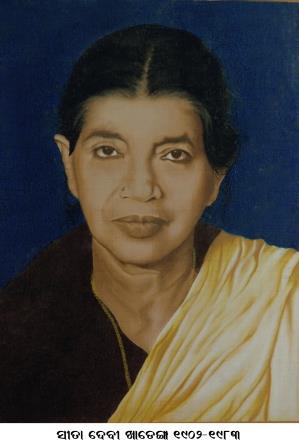Born :- 18-Feb-1904
Died :- 21-Jun-1983
Place of Birth :- Aska, Ganjam

Born to an orthodox Brahmin family of Asika in Ganjam district in the beginning of the twentieth century, home-schooled Sitadevi Khadanga, like a few others, has done wonders in the field of Odia literature and served society as per demand of her times. She was a dramatist, a novelist, a poet, a translator and an organiser. Set in rural Odisha, her writings depict social problems that persisted then as a legacy of the past centuries.
Sitadevi, born in 1902, received no formal education, but was home-schooled by a visiting teacher. She married Banchhanidhi Khadanga, a school teacher.
Sitadevi wrote social dramas during the 1950s which were staged in various places in Ganjam. She established a theatre known as Harihar Natya Mandir, and a literary institute, Krishna Singh Sahitya Parishad, both in Asika.
After her marriage, she began reading plays, and perceived them as a superior literary form. After her children left home for higher education she started writing plays. Her first play was ‘Sahodar’, which was based on the experiences she had in her life. It has been described by her as " the story of a woman's life among her husband and children in a middle-class family". Her other plays include ‘ Nari ’, ‘ Poshyaputra ’, ‘ Naisthika’, ‘ Prachinpanthi ’, ‘ Kshudhara Pida’ and ’ Matruhina ’. Her play ‘ Mandir Prabesh’ deals with the rights of Harijans to enter Hindu temples.
Sitadevi's first novel was an adoption of her own play ‘Poshyaputra’, which is based on a variety of problems in society. ‘Agraja’, containing 27 chapters, is a socio-political novel. ‘ Pratyabartan ’ is based on rural life in Odisha. ‘ Mora Jeevan Smruti ’ is her autobiography. She translated Rabindranath Tagore's ‘ Ghare Baire ’ from Bengali into Odia. She also wrote poems which played a significant role in the cultural renaissance of Odisha. Her contribution to Odia poetry is considered to be a landmark in Odia literature. Sitadevi breathed her last in 1983.
